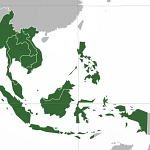Abstract
This article examines how Indian Knowledge Systems (IKS), rooted in Vedic and Buddhist traditions, and Chinese Knowledge Systems (CKS), grounded in Confucian principles, influence Cambodia’s value education through soft power.¹ IKS emphasises ethical values and holistic learning, while CKS prioritises social harmony and technical skills.² Through historical analysis, stakeholder perspectives, and educational initiatives, the study highlights their contributions, challenges of integration, and proposes a model to harmonise these systems with Cambodia’s cultural heritage, fostering ethical leadership and cultural cohesion.³
Keywords: Cultural Diplomacy, Value Education, Indian Knowledge Systems, Chinese Knowledge Systems, Soft PowerCultural Diplomacy.
Introduction
The concept of soft power, first articulated by Joseph Nye at the end of the 20th century, has become a fundamental component of contemporary international relations, especially in the context of educational diplomacy.⁴ Soft power is defined as the ability of a country to persuade others to do what it wants through attractiveness and attraction instead of coercion or payment.⁵ This soft power is especially significant in the global field of education, where nations compete to influence future generations through the dissemination of knowledge, cultural exchanges, and value education.⁶ In Cambodia, a nation with a rich historical tapestry but contemporary challenges, the growing commitment of foreign nations, particularly India and China, exemplifies how soft power can be instrumental in shaping educational paradigms and social values.⁷
In the Cambodian context, education acts not only as a vehicle for personal progress but also as a means of constructing the nation and cultural reinforcement.⁸ While Cambodia seeks to navigate its transformation after conflict and seek sustainable development, the external influences of India and China represent dual pathways through which the soft power in the country’s education system is manifested.⁹ Both nations offer different knowledge systems that integrate their cultural values, philosophical principles, and pedagogical approaches.¹⁰ The historical legacy of Indian Buddhism, its philosophical discourses, and its vibrant contemporary academic landscape contribute to a vision of education that prioritises ethical frameworks, community-centred values, and a holistic understanding of knowledge.¹¹ In contrast, China’s educational influence, underlined by the Confucian emphasis on moral integrity, social harmony, and respect for authority, turns towards the creation of disciplined and collectively oriented citizens.¹²
The importance of soft power in Cambodia is amplified by its position as a developing nation dealing with the legacies of war and economic instability.¹³ The education sector serves as a critical battlefield where different cultural narratives collide, converge, and finally shape the aspirations of young Cambodian people.¹⁴ The integration of Indian and Chinese knowledge systems is not simply an academic issue, but also an ideological commitment that helps redefine what it means to be educated in Cambodia.¹⁵ The infusion of these knowledge systems has the potential to cultivate a more diverse set of values, which addresses both the rigour of academic excellence and the emotional aspects of moral education, thus promoting a more rounded citizenship.¹⁶
Soft Power Dynamics in Cambodian Education
As Cambodia continues to define its development trajectory, the role of soft power in education requires careful analysis of influences in the game.¹⁷ Understanding how these foreign knowledge systems are intertwined with local educational practices provides invaluable ideas about the broader implications for value education in Cambodia.¹⁸ The soft power, a term coined by Joseph Nye at the end of the 20th century, refers to the ability of a country to influence others through attraction and persuasion instead of coercion, mainly using cultural, ideological, and institutional attraction.¹⁹ In the context of international relations, soft power has become a crucial element, especially within the field of education.²⁰ As nations compete for influence, the power of knowledge systems becomes instrumental not only in the configuration of perceptions but also in the establishment of lasting relations between countries.²¹







